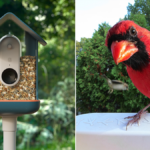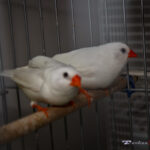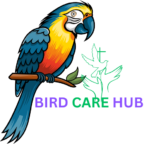Finch Bird Food
Discover the ultimate guide on finch bird food to keep your finch healthy and vibrant. Learn what to feed your finch and ensure a balanced diet with our expert tips.
Finches are small, colorful birds that bring joy to bird enthusiasts with their cheerful chirping and vibrant plumage. To maintain their health and vitality, it’s crucial to provide the right finch bird food. This guide will cover everything you need to know about feeding your finch, ensuring they receive the nutrients necessary for a long and happy life.
Understanding the Dietary Needs of Finches
Finches are primarily seed eaters in the wild, but their diet is not limited to just seeds. They require a variety of nutrients that come from a mix of seeds, fruits, vegetables, and sometimes insects. A balanced diet is essential for their overall health, immune system, and feather condition. When selecting finch bird food, it’s important to understand their natural eating habits and replicate them as closely as possible in captivity.
Key Components of Finch Bird Food
- Seed Mixes: The foundation of a finch’s diet should be a high-quality seed mix specifically formulated for finches. Common seeds found in these mixes include millet, canary seed, and flaxseed. A good finch bird food seed mix should have a variety of seeds to provide different nutrients and prevent dietary boredom.
- Pellets: Pellets are formulated to provide a complete nutritional profile for birds. While seeds are a great source of carbohydrates and fats, they often lack essential vitamins and minerals. Pellets ensure that your finch gets a well-rounded diet and can be mixed with seeds to balance the diet.
- Fresh Fruits and Vegetables: Finches enjoy a variety of fruits and vegetables, which provide essential vitamins, minerals, and antioxidants. Suitable options include apples, grapes, carrots, broccoli, and spinach. These should be offered in moderation and always fresh, as spoiled produce can harm your bird.
- Egg Food: Egg food is an excellent source of protein, especially important during breeding, molting, or growth periods. It can be purchased as a commercial mix or prepared at home using boiled eggs. This supplement can boost the protein content in your finch bird food, ensuring they receive all the necessary amino acids.
- Live Foods: Insects like mealworms or small crickets can be offered occasionally to mimic the natural diet of finches in the wild. These are a great source of protein and can be particularly beneficial during the breeding season or when finches are raising chicks.
How to Feed Finches Properly
Feeding finches is more than just providing food; it’s about ensuring that they eat a balanced diet. Here are some tips on how to properly feed your finches:
- Provide Variety: Just like humans, finches appreciate variety in their meals. Offering different types of food keeps them interested and ensures a well-rounded diet.
- Freshness is Key: Always provide fresh food and water daily. Discard any uneaten food before it spoils, as moldy or stale food can lead to health issues.
- Proper Portion Sizes: Avoid overfeeding your finches, as they can become overweight. A typical finch will eat about 1 to 2 teaspoons of seed mix per day. Adjust portions based on your bird’s activity level and nutritional needs.
- Supplement Sparingly: While supplements like vitamins and minerals can be beneficial, they should be used sparingly and only as needed. A well-balanced finch bird food mix generally covers most dietary requirements.
Common Mistakes to Avoid When Feeding Finch Bird Food
- Relying Solely on Seeds: A seed-only diet can lead to nutritional deficiencies. Seeds are high in fat and low in essential nutrients like calcium, which can cause health problems over time.
- Ignoring Fresh Foods: Finches need the vitamins and moisture that fresh fruits and vegetables provide. Neglecting this aspect of their diet can lead to poor health and feather condition.
- Over-Supplementing: While supplements can help, too much can be harmful. For example, excessive calcium can cause kidney damage, and too many vitamins can be toxic. It’s best to follow a vet’s advice on supplementation.
- Providing Unsafe Foods: Some foods are toxic to finches, including avocado, chocolate, caffeine, and alcohol.You should always research before providing new foods to ensure their Safety.
Special Dietary Considerations for Finches
- Breeding Finches: During breeding season, finches require extra protein and calcium. Egg food and live insects are excellent additions to their diet during this time.
- Molting Finches: When finches molt, they need more protein to support new feather growth. Increasing the amount of egg food or offering protein-rich pellets can help during this period.
- Young Finches: Chicks and young finches require a higher protein diet for growth. They benefit greatly from soft foods like soaked seeds, mashed fruits, and egg food.
Conclusion
Providing the right finch bird food is crucial to the health and happiness of your feathered friend. By offering a balanced diet that includes a variety of seeds, pellets, fresh produce, and occasional live foods, you can ensure that your finch thrives. Always remember to keep their food fresh, provide clean water daily, and avoid foods that could be harmful. With the proper diet, your finch will be a vibrant and joyful companion for years to come.



